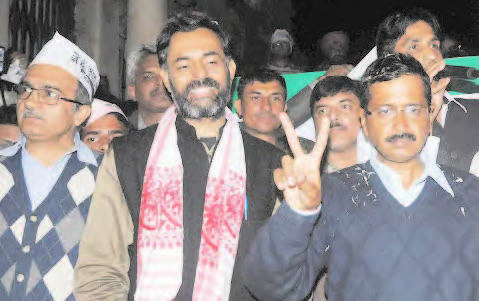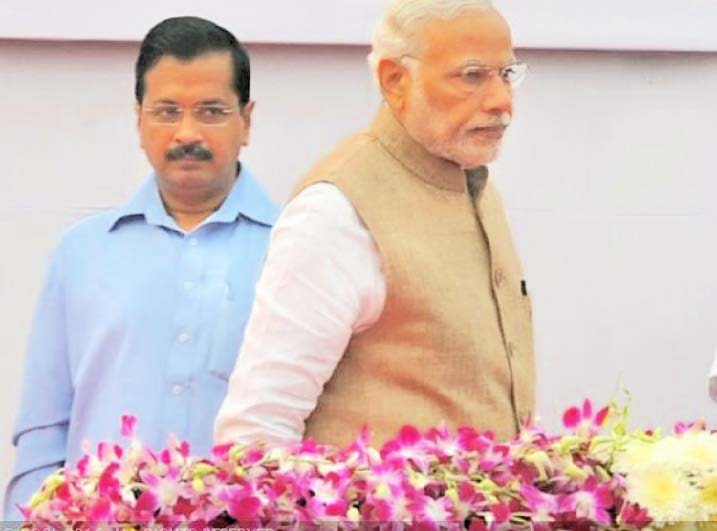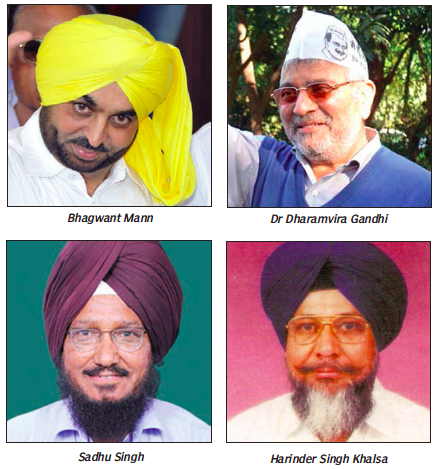
In the Aam Aadmi Party, morality collided with realpolitik. Unsurprisingly, the latter won. Many supporters of the party, who gave it such a stunning victory in the Delhi assembly elections, are nursing their hurt and are reconciling themselves to the end of another illusion.
The AAP leader and now Delhi’s Chief Minister, Mr. Arvind Kejriwal, was never in doubt on two points. One, he had to stamp his authority on the baby party. Second, while the morality stick was good to wave, the hard reality of playing politics had to take the first place.
Mr. Yogendra Yadav and Mr. Prashant Bhushan, with their persistent admonitions and waving the flag of morality, had simply become too distracting and inconvenient for Mr. Kejriwal’s plan to rule his fledgling party with an iron hand. He had had a taste of their mettle by their objecting to some of the tainted candidates fielded by the party and they had raised questions about large dubious donations.
Mr. Kejriwal thus came to the conclusion that nothing short of a purge of the two from the Political Affairs Committee will do. And he set about it in the hoary tradition of Indian political culture pioneered by the Congress party and followed by all others. First, seek their resignation while airing Mr. Yadav’s clandestinely taped conversation with a journalist to embarrass him. Then offer inconsequential posts to sideline them.
When every trick failed, they were voted out in the executive by a surprisingly narrow 11 to 8 margin. True to the accepted political tradition, Mr. Kejriwal absented himself with the plausible excuse of undergoing treatment while sending in his own resignation as party convener, predictably rejected.
Mr. Kejriwal has won a victory at great cost. Its quantum remains to be determined. The plan did not run to script because neither of the gadflies had an ulterior motive in raising the questions they did. They sought to keep AAP on the straight and narrow: moral imperatives that had persuaded them and so many others to support a party seeking a higher moral ground. The immense response it got in Delhi was due to the electors’ conviction that here was a new party of leaders with conviction who wanted to change the way politics functioned.
As far as the bulk of supporters are concerned, the let-down has been tremendous. While some compromises are necessary in politics as in life, the duplication of the traditional deviousness practiced by Mr. Kejriwal’s henchmen was breathtaking. One can expect the Delhi Chief Minister to undertake an act of showmanship to try to surmount his huge embarrassment, but he will find it difficult to regain trust.
Perhaps the questioning duo was being unrealistic in trying to keep AAP to a high moral benchmark. Perhaps it also became a question of Mr. Kejriwal’s “amour proper”, of men of an intellectual standing challenging his actions in the party. Perhaps the leader who abandoned Anna Hazare’s movement to start a political party felt that only as an unchallenged leader could he deliver on his promises.
By their very nature, these are assumptions, but the crisis in AAP poses larger questions. Can a party that sought to give a new direction to Indian political culture survive the body blow that has been dealt it? How will Mr. Kejriwal convince his bewildered supporters that he is sincere in fulfilling his promises?Has he indeed misjudged his two critics in believing that they can be tackled through traditional methods of placating or expelling them?
These are portentous questions that go to the heart of the rationale for a new party. Judging by the number of defections to the Bharatiya Janata Party after its impressive victory in the Lok Sabha elections last year, politicians gravitate towards power, especially when the future of the losing party seems bleak. To give one example of horse-trading, we all know how Mr. P.V. Narasimha Rao converted his minority government at the Centre into a majority dispensation.
The shock over how the AAP crisis was managed was in the tawdry nature of the tricks that were played upon the dissenting duo by Kejriwal loyalists. They hopelessly misread the dissenters who were not raising objections for their own aggrandizement, but were highlighting the nature of the compromises made in winning the Delhi elections.
Mr. Kejriwal’s stance of being above the conflict by absenting himself from the executive meeting and sending in his own resignation are old tricks in the political game. It is worth noting, however, that in a vainglorious move, he has divested himself of all portfolios in the newly-formed Delhi ministry so that he remains the monarch of all he surveys.
The tragedy for those who voted for AAP in Delhi – and millions more across the country cheering the new kid on the block — is that the melodrama played out in the executive committee came so soon after its unprecedented triumph. It represents a let-down of immense proportions.
Mr. Yadav and Mr. Bhushan, who were sought to be banished from AAP, have not taken the bait. Mr. Yadav has said he would abide by the party’s decisions and help the party go forward because it had been founded on so many hopes and aspirations. Obviously, he will raise questions troubling him at the party’s larger forums.
Whatever the future holds for AAP, the party has witnessed its watershed moment. The party on the hill has tottered and Mr. Kejriwal’s task now is how to rescue it from the dirty politics played in his name and presumably under his direction. He has time to think through his tactics while undergoing treatment. There would be little profit in dissembling to suggest that he was unaware of what was being enacted.
Many AAP supporters and the wider public will wonder whether they had again backed the wrong horse. By turning the party’s back on two of its most illustrious founder members, it has betrayed the trust of many. It remains to be seen whether the duo will be allowed to play any role in the party’s larger forums, given the level of animosity Kejriwal loyalists have displayed.





Be the first to comment